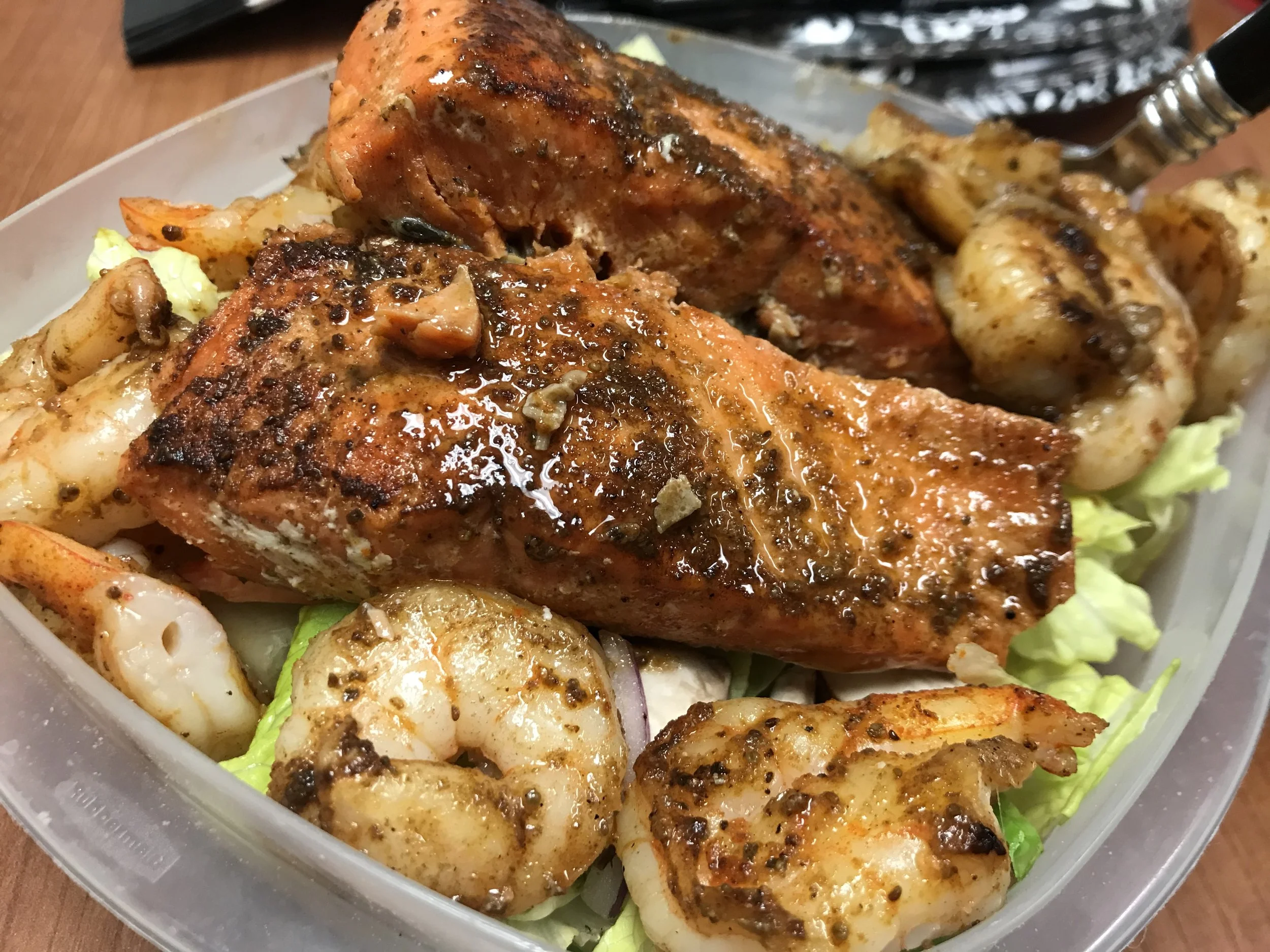What the Heck is Keto - and Will it Kill Me?
Ah, the famous / infamous “Keto.”
“It’s going to give you a heart attack! It’s so good for weight loss! Eating that much fat can’t be good! I feel amazing and reversed my diabetes!!”
So which is it? A health miracle or a recipe for cardiovascular disease?
Also, what is Keto? How is it similar or different to other popular diets like Atkins, Paleo, Primal, NSNG, and others? I’m going to take you through the important points and at the end we’ll discuss if is it safe to eat this way.
Keto - the shortened term for a ketogenic diet - A way of eating which puts your body into a state of “ketosis” where it primarily burns fat for fuel rather than carbohydrates. Considered to be a high-fat, low-carb diet, often keeping carbohydrates below 50 g/day.
While I am probably often in dietary ketosis and I do eat low-carb, I have never eaten a “keto” diet the way many people do. I don’t like to count carbs and I wanted to develop a healthy relationship with food, something that could harken back to the way humans have always thought of food, rather than focusing on labels and marketing.
What I like about keto: The term is popular and many people understand - to some extent - what you mean when you say keto.
What I don’t like about keto: Companies have jumped on the keto bandwagon, marketing products which aren’t real food and many of which aren’t even low-carb to unsuspecting, would-be dieters. Many people link keto naturally in their heads to words like “unsustainable” and even “unhealthy.” There’s always some negative outcomes of being popular, and this is keto’s.
Eating a ketogenic diet - without the marketing, and without the drama - is likely how we ate for most of human history. Imagine our ancient ancestors - what type of foods were available to them? Plants and animals. That’s it. Food, the way we think of it today, has mostly been invented or created. We’ve even altered plants and animals a great deal - luckily, most of them are still available to us as healthy food, but I do consider this when eating things that wouldn’t have been available to my locality and wouldn’t have had year-round availability.
Keto, Paleo, Primal, Atkins, and NSNG all have slightly different definitions, but the idea is the same, and they would all fall into a low-carb, high-fat category. By the way, low-carb, high-fat doesn’t mean drinking butter or eating fat bombs, nor does it mean eliminating carbohydrates completely. It simply flips what most people eat, high-carb, low-fat, on its head. If you eat a standard American diet and you don’t think you eat a high-carb diet, I invite you to do just one day of counting and see for yourself.
Do you find all of these diet labels as obnoxious as I do?
They are confusing and unnecessary, making the simple concept of eating what our ancestors ate, into a complex “am I following the rules” type of movement. However, I do think talking about them opens the door for people to understand. You don’t need to know all of the rules, and you don’t even need to know how these diets are similar or different. What is helpful to know is how these diets affect our human bodies and why they are so successful at causing weight-loss. This information is the key to understanding their healthfulness - or not.
Blood Glucose / Blood Sugar -
the amount of glucose in your blood at any given time
Insulin -
the hormone responsible for controlling blood glucose levels
Briefly: When we eat food, especially carbohydrates, our body must release insulin to keep the amount of glucose in our blood in an acceptable range. In a healthy adult, this mechanism works without us even noticing it. Our blood sugar and our insulin raise and lower throughout the day keeping us fueled and stable.
Where does the glucose go? Insulin pushes it into the cells for storage. Think of this as a one way door. When the glucose is being pushed in, no matter how much energy is already stored in the cells, none of it can be let out. When we embark on a low-carbohydrate diet, our glucose spikes are not as high and our body doesn’t have to secrete as much insulin. This means there is more time when the energy can flow the other direction - out of the cells and into the blood.
What this means for us is even if we have plenty of energy stored in our cells, if our glucose is being spiked regularly, our insulin is flowing, keeping the one way door going into cells, not out of them. The double whammy of this system, is that once much of the blood glucose is shuffled into the cell, we get hungry because we are used to a higher blood glucose, and we eat again, starting the cycle over at the beginning. This is why people who snack have to snack.
Conversely, lower-carbohydrate diets keep glucose spikes lower. When your body is used to a low-carb diet, it readily burns fat for energy, keeping your blood glucose levels very stable and you don’t get hungry as often. Eating less often reduces the flow of insulin even more, which allows our cells to stay open and keep allowing the energy out. This is why, when you are consistent with a lower-carb diet, you burn fat readily and lose weight with seeming “ease” compared to other weight loss methods.
Is it Healthy?
The answer to this question depends on who you ask. I believe it’s a resounding YES. I have spent years researching low-carb diets, listening to experts, and “experimenting” for myself. I have seen men and women reverse diabetes (type two), lose hundreds of pounds of weight, get off of medications, gain energy, health, and success on low-carb diets. That’s right, getting healthy doesn’t just affect your body: It affects everything you do and you will have a better chance of other types of success if you are healthy.
Who is it For?
Humans. Establishing a healthy relationship with food is for all humans, big and small. Our bodies have a preferred fuel source, and for the vast majority of us, that’s fat. Our bodies even make a high-fat substance for the growth of the tiniest of us - breast milk. That’s right, even newborns are eating full-fat dairy. The few people who don’t fall into the fat-is-preferred category do so because of significant body alterations or disease. Even people without gallbladders can be successful on a ketogenic diet.
What About Heart Disease?
The answer to this question is unfortunately very scientific. At least, it takes a lot of sorting through evidence to see why we ever believed fat caused heart disease to begin with. Remember, science is the study of information, and we’re always learning, experimenting, and growing in our understanding of life, the universe, and everything.
Humans didn’t evolve / or weren’t created with a fear of fat. We always ate it. We only became concerned about dietary fat and cholesterol in the 1950s. A prominent scientist of the day, Ancel Keys, believed very strongly that dietary fat causes heart disease, and he pushed this agenda hard. His message got out there due to his tenacity rather than due to his hypothesis being correct. We’ve all been suffering under the misconception ever since.
I can’t lay out the science for you in this short article, but the best book I’ve read that outlines how and why we subscribed to the “Diet-Heart Hypothesis” (that is, fat causes heart disease) as a society, is the Big Fat Surprise, by Nina Tiecholz. This book is one of the very first I read when starting down my low-carb journey. I was a young nurse and had newly started eating “NSNG,” my gateway into the low-carb spectrum. Like you, I wanted to know: “Is eating low-carb going to harm my health?” We are all independent, intelligent, humans. We all have the right to look at evidence and information and decide things for ourselves.
I chose a whole-food, low-carb diet, and have been eating this way for over 7-years. I will continue to discuss this proper human diet with you and what it actually looks like in practice. In the beginning it could be tricky for me to navigate, but I have firmly established a healthy relationship with food and I can confidently say:




